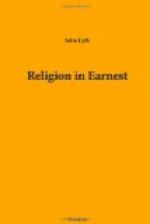On their marriage, which took place shortly after, Mr. and Mrs. Burdsall removed to York. The offended father, true to his word, sent his daughter forth literally destitute; not even permitting her to take her personal apparel. It was not until twelve months had elapsed, that any further communication took place. The interview is thus related by Mr. Burdsall in his own quaint style. “I happened to be passing near his house as he was going from it; on my calling to him, he asked what I wanted with him. I said, ’I want to know what place you mean me to have in heaven?’ He smiled, and asked, ’Do you mean to go there?’ ‘I hope so,’ said I. He then asked me why I had married his daughter. I told him, because I loved her and thought she would make me a good wife. I added, ’You know, sir, that I told you before I married her, that I would not marry her for the sake of her fortune; neither have I, I do not expect any, the Lord blesses us without any, and he will still continue to bless us.’ He acknowledged the truth of what I said, and we parted.” The fire of wrath was still smouldering in the heart of the old man, and awakened in the mind of Mrs. Burdsall feelings of painful anxiety, especially, as it was apparent, that life was ebbing fast to its close. Mr. B. therefore, a short time after, addressed a kind but faithful letter to him on the great subject of salvation, and concluded with these remarkable and expressive words, “I have no other reason for writing to you, that I know of, than this, that the sun is going down.” This produced no immediate effect, only, whenever they met, Mr. Stables would say, “You write parables to me.” The allusion however so appositely and wisely put, like an arrow directed to the mark, had fastened upon his conscience, and was secretly undermining the strength of long and obstinately-cherished resentment. The marksman was skilful, but still better, a man of




